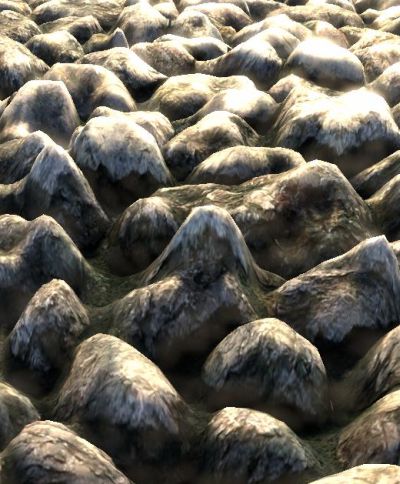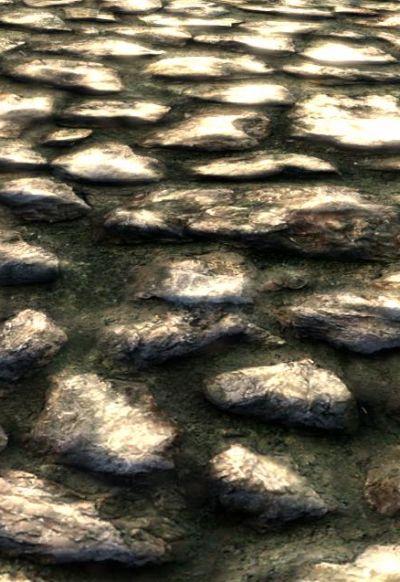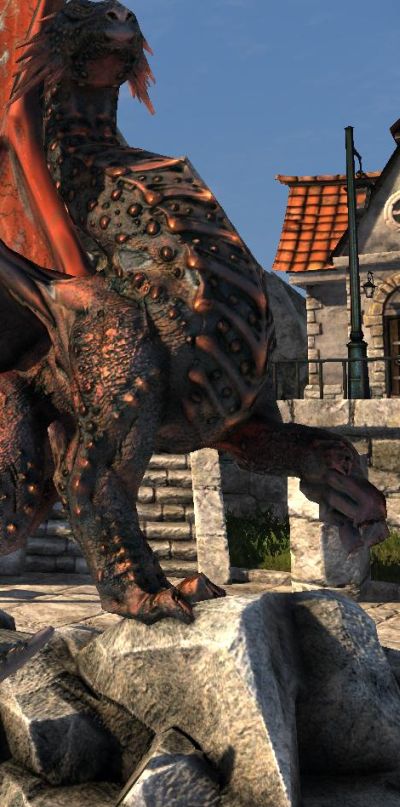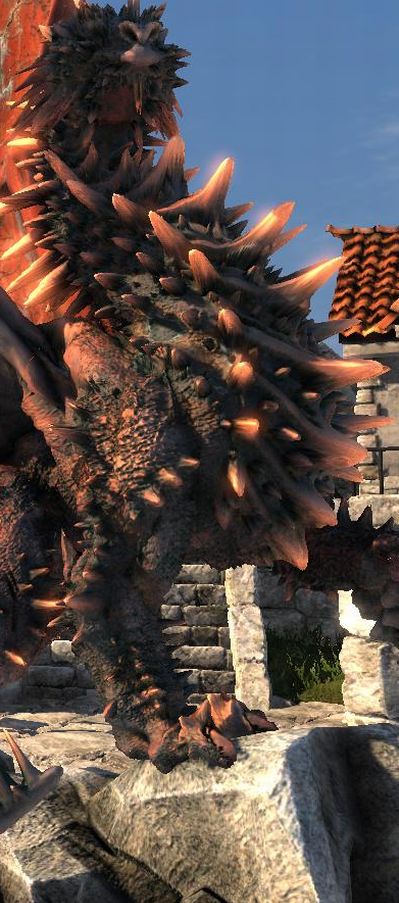
Tessellation ON

Tessellation OFF
I played a little with the new Unigine Heaven 2.0 benchmark and here are some scores with a the MSI R5770 Hawk and a Radeon HD 5870 (reference board).
Direct3D 11
– R5770 Hawk, 1920×1080 fullscreen, no AA, D3D11, CPU Intel Core 2 E8400, 2GB RAM DDR3 1333MHz, Win 7 64-bit
- Moderate tessellation: 649 (25.8 FPS) Min FPS: 5.9, Max FPS: 57.5
- Normal tessellation: 572 (22.7 FPS) Min FPS: 12.7, Max FPS: 55.9
- Extreme tessellation: 382 (15.2 FPS) Min FPS: 6.5, Max FPS: 48.0
– Radeon HD 5870, 1920×1080 fullscreen, no AA, D3D11, CPU Intel Core 2 E8400, 2GB RAM DDR3 1333MHz, Win 7 64-bit
- Moderate tessellation: 1140 (45.3 FPS) Min FPS: 31.2, Max FPS: 104.4
- Normal tessellation: 942 (37.4 FPS) Min FPS: 19.9, Max FPS: 99.9
- Extreme tessellation: 553 (22 FPS) Min FPS: 7.4, Max FPS: 78.0
OpenGL
– R5770 Hawk, 1920×1080 fullscreen, no AA, OpenGL (2 or 3?), CPU Intel Core 2 E8400, 2GB RAM DDR3 1333MHz, Win 7 64-bit
- No tessellation: 907 (36.0 FPS) Min FPS: 12.0, Max FPS: 62.7
– Radeon HD 5870, 1920×1080 fullscreen, no AA, OpenGL (2 or 3?), CPU Intel Core 2 E8400, 2GB RAM DDR3 1333MHz, Win 7 64-bit
- No tessellation: 1557 (61.8 FPS) Min FPS: 36.5, Max FPS: 120.3
And here are some screenshots with the R5770 that show the impact of tessellation (scale: 1.5, factor: 2.0, distance: 2.0)
– Tessellation ON: 8 FPS Avg
– Tessellation OFF: 30 FPS Avg

Tessellation OFF

Tessellation ON

Tessellation OFF

Tessellation ON
Cool.
Thanks for sharing.
Unigine
Heaven Benchmark v2.0
FPS: 16.1
Scores: 405
Min FPS: 4.6
Max FPS: 41.9
Hardware
Binary: Windows 32bit Visual C++ 1500 Release Mar 7 2010
Operating system: Windows 7 (build 7600) 64bit
CPU model: Intel(R) Core(TM)2 Duo CPU E8400 @ 3.00GHz
CPU flags: 3581MHz MMX SSE SSE2 SSE3 SSSE3 SSE41 HTT
GPU model: ATI Radeon HD 5800 Series 8.712.3.0 1024Mb
Settings
Render: direct3d11
Mode: 1920×1200 8xAA fullscreen
Shaders: high
Textures: high
Filter: trilinear
Anisotropy: 16x
Occlusion: enabled
Refraction: enabled
Volumetric: enabled
Replication: disabled
Tessellation: extreme
Unigine Corp. © 2005-2010
Above card is a XFX 5870 OC’ed at 900/1263. Thanks!
Using final drivers i hope 10.3!
Yes, I used final 10.3 🙂 thanks for pointing that out.
If I use two of these in CrossFire, I could probably get 30fps+ minimum. As you can see ALL settings are maxed out in the above test. I am impressed. This is definitely a very powerful video card. At 1920×1200, i run ALL games at max everything.
The above test was with 4gb DDR2 1066. I am receiving a i7 920, with 6gb DDR3 today, and want to see if there is any gains. I don’t think the benchmark will be affected much with the change in CPU and RAM, but let’s see what happens. I probably won’t have time to swap the hardware till later this weekend.
Hi i get this results with the same settings as march:
fps: 21
score: 530
min: 5
max: 64
Hardware:
Drivers 10.3
HD 5970 / q9550 /8G RAM
Everything stock.
Isnt this a little bit low for this card?
Sorry my mistake user is JC, i accidental read the date.
this is so freken COOOOOOOOL guys. I was playing this at school when the bell went. Forgot i had to go to class and missed 15 min of work HAHAHAHAHAHAHA.
LOL okay that my VGA does not have the technology of GF GTX480 more my Benchmark was much better than the GTX480 I have a HD48070X2 see below
Unigine
Heaven Benchmark v2.0
FPS: 41.2
Scores: 1037
Min FPS: 20.8
Max FPS: 67.2
Hardware
Binary: Windows 32bit Visual C++ 1500 Release Mar 7 2010
Operating system: Windows 7 (build 7600) 64bit
CPU model: Intel(R) Core(TM)2 Duo CPU E8400 @ 3.00GHz
CPU flags: 2982MHz MMX SSE SSE2 SSE3 SSSE3 SSE41 HTT
GPU model: ATI Radeon HD 4870 X2 8.712.0.0 CrossFireX 1024Mb
Settings
Render: direct3d11
Mode: 1920×1200 8xAA fullscreen
Shaders: high
Textures: high
Filter: bilinear
Anisotropy: 16x
Occlusion: enabled
Refraction: enabled
Volumetric: enabled
Replication: disabled
Tessellation: disabled
Unigine Corp. © 2005-2010
Just to make something clear to some of you. The Tessellation being on will actually drop some cards by over 60%. Meaning that the Gforce 480 would probably push 80-90 average fps with that not enabled. Oh and before it is said, no I am not an Nvidia fan, Actually ATI…
Hi all i have just installed to gtx 480’s today and thought some of you might be interested to see the results.
Unigine
Heaven Benchmark v2.0
FPS: 52.7
Scores: 1328
Min FPS: 9.0
Max FPS: 122.0
Hardware
Binary:Windows 32bit Visual C++ 1500 Release Mar 7 2010
Operating system:Windows 7 (build 7600) 64bit
CPU model:Intel(R) Core(TM) i7 CPU 920 @ 2.67GHz
CPU flags:3619MHz MMX SSE SSE2 SSE3 SSSE3 SSE41 SSE42 HTT
GPU model:NVIDIA GeForce GTX 480 8.17.11.9741 1536Mb
Settings
Render:direct3d11
Mode:1680×1050 4xAA fullscreen
Shaders:high
Textures:high
Filter:trilinear
Anisotropy:16x
Occlusion:enabled
Refraction:enabled
Volumetric:enabled
Replication:disabled
Tessellation:extreme
Pingback: GeForce GTX 480 4-Way SLI Tested with FurMark - 3D Tech News, Pixel Hacking, Data Visualization and 3D Programming - Geeks3D.com
Unigine
Heaven Benchmark v2.1
FPS:
53.6
Scores:
1350
Min FPS:
16.4
Max FPS:
122.4
Hardware
Binary:
Windows 32bit Visual C++ 1500 Release May 21 2010
Operating system:
Windows 7 (build 7600) 64bit
CPU model:
AMD Phenom(tm) II X6 1055T Processor
CPU flags:
2800MHz MMX+ 3DNow!+ SSE SSE2 SSE3 SSE4A HTT
GPU model:
NVIDIA GeForce GTX 470 8.17.12.5896 1280Mb
Settings
Render:
direct3d11
Mode:
1280×1024 fullscreen
Shaders:
high
Textures:
high
Filter:
trilinear
Anisotropy:
4x
Occlusion:
enabled
Refraction:
enabled
Volumetric:
enabled
Replication: disabled
Tessellation:
normal
Unigine Corp. © 2005-2010
hello all just wondering if this is a good benchmark result? thanks